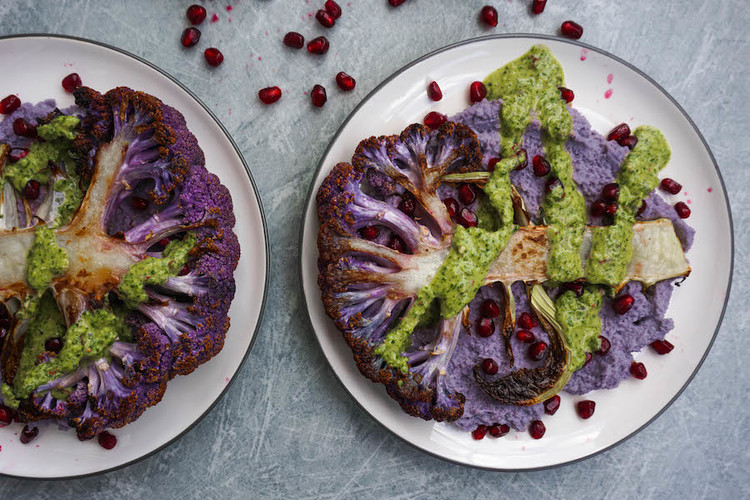Purple Cauliflower Steaks with Mint Chutney and Pomegranate

Ingredients
- 1 large purple (or white) cauliflower
- 2 tbsp olive oil
- 3/4 cup coconut milk
- 1 tbsp tamari
- 1 clove garlic, crushed
- 1 cup loosely packed mint leaves
- 2 tsp fresh ginger, grated
- 1 tbsp maple syrup
- Juice 1/2 lime
- 1/4 cup water
- 1 tsp salt
- 2 tsp tahini
- Seeds from half a pomegranate
- Extra mint leaves to garnish
Takes ,serves 2.
Instructions
- Preheat oven to 180°C (350°F)
- Cut two thick "steak like" slices from the cauliflower by cutting from top to bottom, close to the centre. Try and keep as much of the stem intact as possible as this will give the steaks more structure. Reserve the leftover florets from the sides of the cauliflower for the mash
- Heat 1 tbsp olive oil in a medium fry pan over high heat. Sprinkle the 'steaks' with salt and fry for around 3-4 minutes on each side until just golden Place steaks on a lined baking tray
- Place the cauliflower steaks in the oven for around 15 minutes until just soft all the way through when you slice with a sharp knife
- While the steaks are baking, make the mash: roughly chop the remainging cauliflower florets and add to a saucepan with the coconut milk, tamari and crushed garlic. Bring to the boil and then simmer, covered, until the cauliflower is very soft (around 10 min)
- Add the cauliflower mash mixture to a blender and process until silky smooth. Remove from the blender and give the blender a quick rinse
- Add the mint leaves, ginger, maple, lime juice, water, salt, tahini and remaining 1 tbsp of olive oil to the blender and process until a thick sauce appears. If it is too thick add a little more olive oil or a dash more water
- Time to plate up! Spread a generous amount of cauli mash over two large plates, then top with a piece of cauliflower steak, a drizzle of mint chutney and sprinkling of pomegranate seeds. Enjoy the beautiful array of colours on your plate!
















